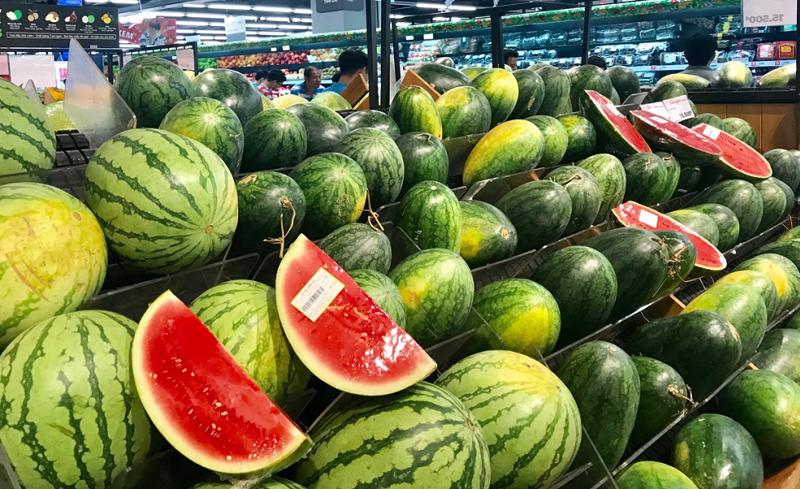Agricultures, Foods, News & Event
Accelerate expansion of agricultural export market share to China
With watermelon just being allowed to be officially exported to China, up to now there have been 14 types of Vietnamese agricultural products officially exported to the Chinese market. Vietnam’s agricultural industry hopes that after the visit to Vietnam by General Secretary and President of China Xi Jinping, agricultural trade will be further promoted…
The Plant Protection Department (Ministry of Agriculture and Rural Development) said that the signing ceremony of the Watermelon Export Protocol was carried out during the visit to Vietnam by General Secretary and President of China Xi Jinping from April December 12 – 13. This signing is an important step, allowing Vietnamese watermelons to be officially exported to the Chinese market.

WATERMELON IS EXPORTED TO CHINA
The Protocol clearly defines import requirements from China, to ensure that Vietnam’s fresh watermelons comply with China’s laws, regulations and standards related to food hygiene and safety, as well as such as plant quarantine requirements; thereby creating a basis for compliance by Vietnamese manufacturing, packaging and exporting units.
Accordingly, Vietnamese watermelons must not be contaminated with 5 living plant quarantine species that China is concerned about, including: fruit flies Bactrocera correcta, Bactrocera zonata, Bactrocera latifrons, aphids Phenacoccus solenopsi and acidovorax bacteria avenae subsp.
The protocol stipulates that all growing areas and packing facilities for watermelons exported to China must be registered and approved by both the Ministry of Agriculture and Rural Development and the General Administration of Customs of China. Gardens must apply good agricultural practices (GAP); Must ensure supervision of the growing garden and packaging process at the packaging facility. Packaging facilities must build a traceability system to be able to trace the growing area that has been assigned a code.
In addition, the shipments will be imported through all Chinese border gates permitted by the General Department of Customs of China to import fruit; must conduct 2% plant quarantine sampling and must comply with China’s national food safety standards.
Mr. Huynh Tan Dat, Director of the Plant Protection Department, said that as of December 14, 2023, there were 14 types of Vietnamese agricultural products officially exported to the Chinese market, including: Dragon fruit , longan, rambutan, mango, jackfruit, watermelon, banana, mangosteen, lychee, black jelly, passion fruit, durian, sweet potato and bird’s nest. In addition, China has allowed cross-border export of 12 fruit and vegetable products, milk, 805 seafood processing facilities, 40 live crab and lobster packaging facilities and 5 black tiger shrimp and shrimp packaging facilities; 128 species/product types and 48 aquatic species.
CHINA ACCOUNTS 23.2% OF VIETNAM’S AGRICULTURAL EXPORT MARKET SHARE
Mr. Phung Duc Tien, Deputy Minister of Agriculture and Rural Development, said that the Chinese market leads in the total export value of Vietnam’s agricultural, forestry and fishery products, with about 11.5 billion USD in 11 months of the year 2023, accounting for 23.2%.
The reason agricultural, forestry and fishery exports to China have grown strongly this year – with a growth rate of 18% over the same period last year, is thanks to many protocols between Vietnam and China signed in the past year 2022, helping many types of agricultural products to be officially exported to this market.
On the other hand, China abolished the Zero Covid policy, reducing and eventually abolishing strict epidemic control measures, helping to release the market’s huge consumer demand, while also helping the import and export customs clearance process. Export goods faster and more conveniently.
China currently accounts for nearly 54% of Vietnam’s total fruit and vegetable export value; Of which up to 90% of lychee output is exported, 80% of dragon fruit output is exported, more than 90% of cassava output and products processed from cassava.
Notably, fresh durian is a fruit with high economic value and is very popular with Chinese consumers, with the export turnover of this product alone to China in 11 months reaching more than 2.1 billion USD.
In the Vietnam – China Joint Statement on December 13 on the occasion of the visit of General Secretary and President of China Xi Jinping, the two sides agreed to apply practical measures to expand the scale of bilateral trade according to the law. balanced and sustainable direction. The two sides agreed to strengthen cooperation in the field of standardization, ensuring harmonization of standards for goods and products of Vietnam and China, especially agricultural products, creating favorable conditions. for bilateral trade cooperation.
The Chinese side will actively promote the market opening process for Vietnamese agricultural products such as fresh coconuts, frozen fruit products, citrus fruits, avocados, custard apples, and oriental medicinal herbs of plants, buffalo meat, beef, pork, products from cattle and poultry meat.
The Vietnamese side will actively promote the import of Chinese sturgeon, increase exchanges between professional organizations of the two sides, and promote the healthy development of related industries of the two countries.
The two sides also agreed to apply effective measures to ensure a smooth supply chain of goods for production and consumption between the two countries and in the region. Improve customs clearance efficiency, promote pilot construction of smart border gates at specialized roads for transporting goods through area 1088/2-1089 and specialized roads for transporting goods at Tan Thanh – Po Chai border gate (marker area 1090-1091) belongs to Huu Nghi international border gate (Vietnam) – Huu Nghi Quan (China); Reasonably distribute import and export goods at border gates, ensuring the smooth operation of key border gates….
Sharing with journalists, Deputy Minister Phung Duc Tien expressed: “The Vietnamese agricultural industry hopes that after the visit to Vietnam by General Secretary and Chinese President Xi Jinping, agricultural trade will be strongly promoted stronger”.
According to Deputy Minister Phung Duc Tien, with a population of more than 1.4 billion people and a growing middle class, China is a large market for many high-quality agricultural, forestry and fishery products from Vietnam. However, to take advantage of the opportunity to accelerate agricultural exports to China, it is necessary to demonstrate to Chinese consumers the outstanding quality of Vietnamese agricultural products, along with the reliability of trade.
“Vietnam has many measures to improve product quality to meet import requirements, thereby maintaining and gradually expanding export market share in this market. Specifically, regularly updating information on market demand and China’s regulations on quality standards, food safety, and disease safety,” Deputy Minister Phung Duc Tien informed.
Recently, the Ministry of Agriculture and Rural Development has decentralized the management of issuance of planting area codes and closed establishments to localities to proactively carry out this work from the stage of receiving documents, checking and appraising them. As well as issuing planting area codes, the facility closes and maintains monitoring of conditions in areas that have been granted planting area codes.
Vietnamese specialized agencies have actively provided guidance and professional training to people and businesses on China’s import regulations.
At the same time, strengthen guidance, supervision, and inspection of the issuance, management and use of codes in localities; coordinate with ministries, branches and localities in inspection, examination and handling of violations; Plant quarantine units at border gates strengthen inspection and control of goods and information about growing areas and packaging facilities related to shipments; Detect, strictly handle and absolutely do not issue plant quarantine certificates for shipments that do not comply with regulations.
In general, Vietnamese businesses and farmers have quickly complied and met China’s new requirements and regulations.
Deputy Minister Phung Duc Tien said that in the coming time, the Ministry of Agriculture and Rural Development will strengthen negotiations with China on official exports, ensuring that exported agricultural, forestry and fishery products are standardized and synchronized. quality, packaging, labeling, food safety and hygiene, traceability, logo, trademark, national brand.
Currently, the two sides are coordinating closely to complete procedures and soon sign the Protocol on exporting frozen durian, fresh coconut, medicinal herbs and some of Vietnam’s strong fruits to China.
Source: https://vneconomy.vn/tang-toc-mo-rong-thi-phan-xuat-khau-nong-san-sang-trung-quoc.htm
